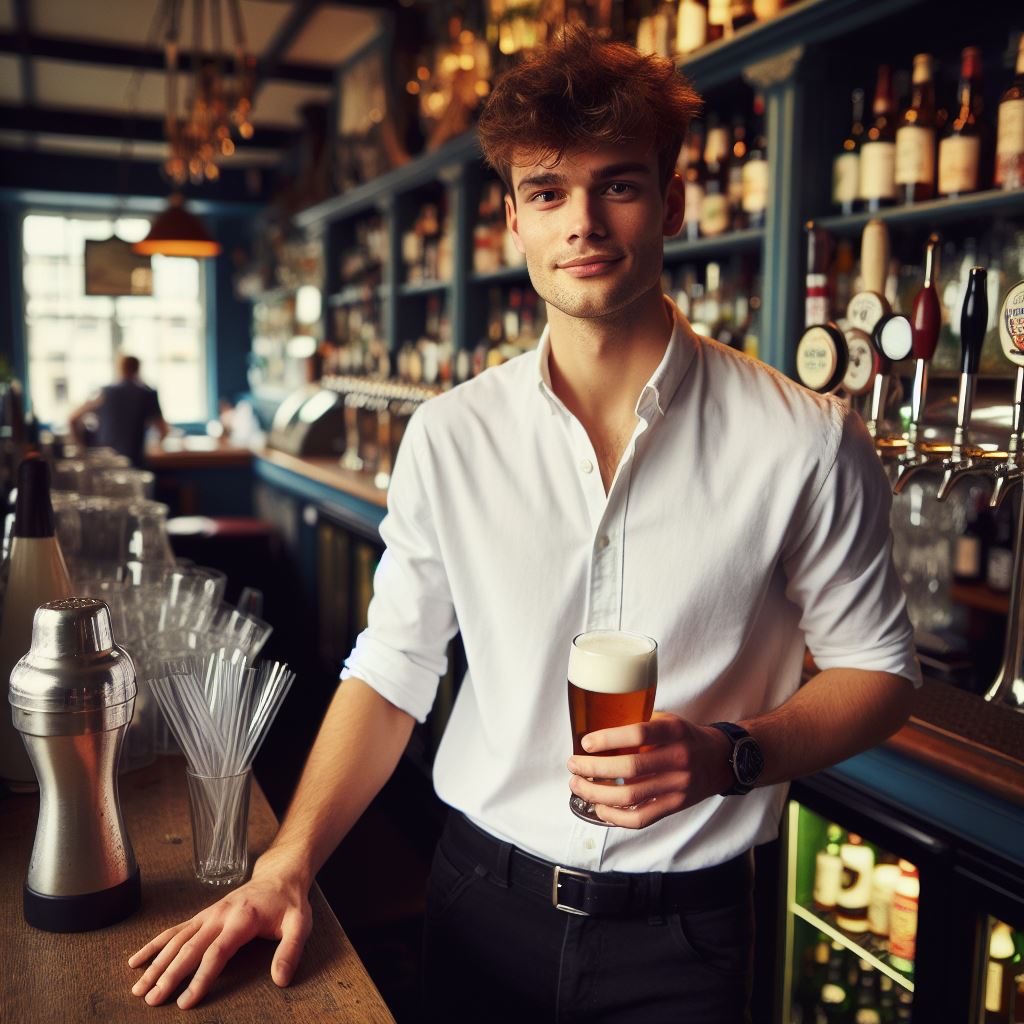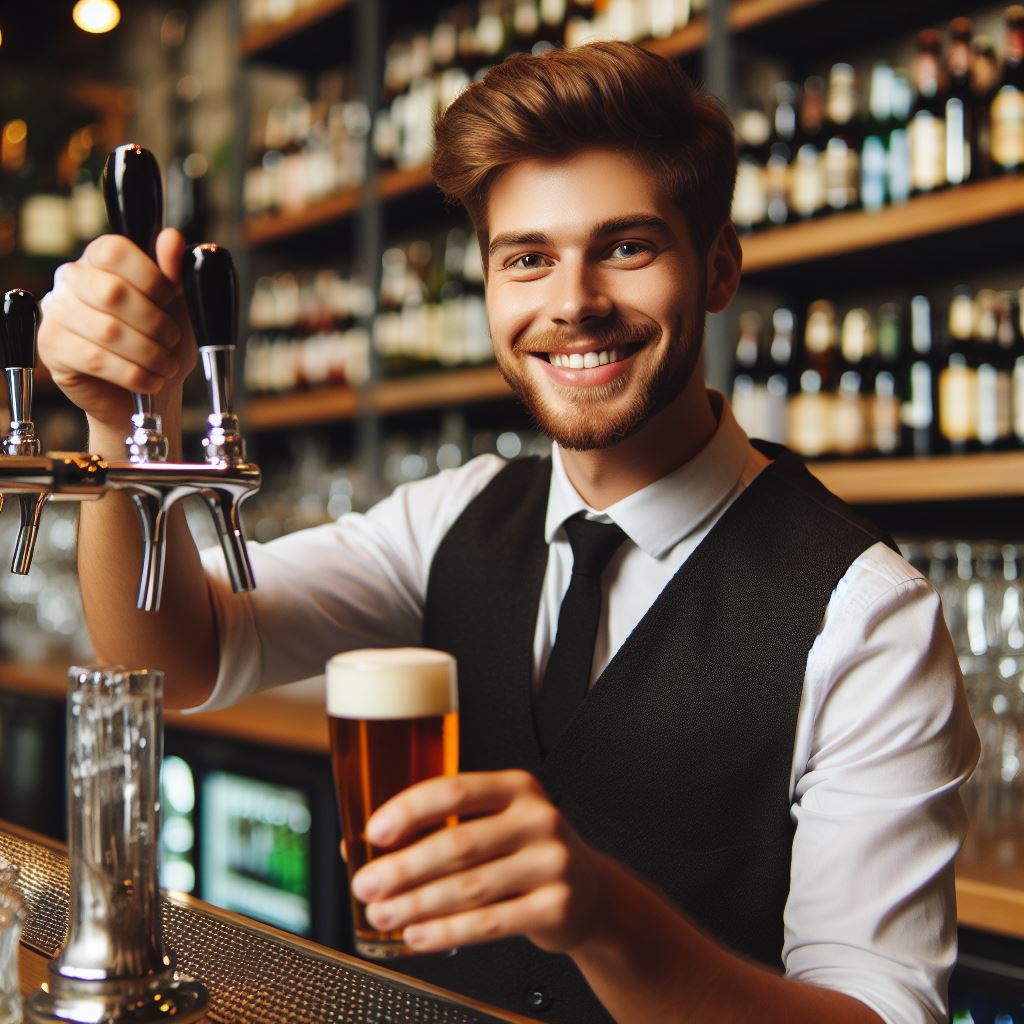Introduction
Customer service plays a crucial role in the hospitality industry by ensuring customer satisfaction.
Bartenders have a vital role in providing exceptional customer service as they directly interact with customers.
Embark on a transformative journey as we explore the nuanced art of customer service tailored specifically for the vibrant landscape of UK bartending.
In this guide, we’ll unravel the secrets behind creating memorable experiences for patrons, mastering the delicate balance between efficiency and warmth.
Beyond mixing drinks, discover the importance of anticipating customer needs, handling challenging situations with finesse, and building lasting connections that go beyond the bar counter.
Whether you’re a seasoned bartender or just stepping into this captivating realm, this guide is your compass to not only meet but exceed customer expectations, leaving an indelible mark on the ever-evolving tapestry of the UK’s bartending scene.
Get ready to hone your skills and craft an unparalleled customer service journey in the world of mixology.
Understanding Customer Service in the UK
Customer service in the UK is deeply rooted in cultural aspects and industry standards.
To provide excellent customer service, it is crucial to understand and appreciate these factors.
Cultural aspects impacting customer service
Politeness and manners
In the UK, politeness and good manners are significant in customer service interactions.
Employees are expected to be polite, respectful, and use appropriate language when dealing with customers.
This cultural aspect sets the tone for positive customer experiences.
Importance of prompt service
Customers in the UK value efficiency and promptness. Prompt service reflects professionalism and attentiveness.
Bartenders need to be quick in taking orders, delivering drinks, and addressing customer needs.
Failing to provide prompt service may lead to dissatisfied customers.
Personalized UK Career Consulting
Receive tailored career guidance designed just for you. Get actionable steps and expert support to boost your career in 1-3 days. Take control of your career now.
Get StartedHospitality industry standards and expectations
Training and certification requirements
Bartenders in the UK undergo comprehensive training programs to enhance their customer service skills.
These programs cover various aspects such as cocktail preparation, knowledge of different spirits, and customer interaction.
Certification, such as the BIIAB Level 2 Award for Personal Licence Holders, is often required to ensure high-quality service.
Professional codes of conduct
The hospitality industry in the UK follows specific codes of conduct to maintain excellent service standards.
Bartenders are expected to act professionally, respect diversity, and maintain a friendly demeanor.
These codes ensure that customers receive consistent and exceptional service across different establishments.
Understanding cultural aspects and industry standards is essential for bartenders to deliver exceptional customer service in the UK.
By adhering to the expectations of politeness, promptness, and professionalism, bartenders can create memorable experiences for their customers.
Additionally, the training and certification requirements for bartenders contribute to their ability to provide excellent customer service.
These programs equip bartenders with the necessary skills and knowledge to meet the expectations of customers and the industry.
By following professional codes of conduct, bartenders can ensure that their interactions with customers are respectful, inclusive, and enjoyable.
These codes contribute to the overall positive perception of the hospitality industry in the UK.
In short, understanding the cultural aspects and industry standards that impact customer service in the UK is vital for bartenders.
By mastering politeness, promptness, and professionalism, bartenders can exceed customer expectations and contribute to the success of the hospitality industry.
Your Dream Job Starts with a Perfect CV
Get a tailored CV and cover letter that captures your unique strengths and stands out in your industry. Let us help you make an unforgettable first impression.
Get StartedRead: Building a Career in Bartending: UK Opportunities
Essential Skills for UK Bartenders in Customer Service
Communication skills
Effective communication skills are crucial for bartenders in the UK hospitality industry.
Bartenders must excel in active listening, paying close attention to customers’ orders and preferences. They should maintain eye contact, use appropriate body language, and respond promptly to customer inquiries.
Non-verbal communication plays a significant role in customer service.
A bartender’s facial expressions, gestures, and overall body language help to enhance interactions and create a positive atmosphere.
A warm smile and friendly demeanor can make customers feel welcome and valued.
Problem-solving abilities
Problem-solving abilities are essential for bartenders to handle difficult customers.
They need to remain calm and composed when faced with challenging situations.
By actively listening and understanding customers’ concerns, bartenders can find appropriate solutions and ensure a positive experience for all customers.
Resolving customer complaints requires empathy and effective communication skills.
By acknowledging their concerns, apologizing sincerely, and offering practical solutions, bartenders can turn a negative experience into a positive one.
This not only retains the customer but also improves the overall reputation of the establishment.
Time management and efficiency
Time management and efficiency are essential skills for bartenders, especially during busy periods.
They need to balance serving multiple customers simultaneously without compromising quality or service.
Optimize Your LinkedIn for Success
Boost your LinkedIn profile with a professional bio, keyword-rich headline, and strategic recommendations that attract recruiters. Stand out from the crowd and get noticed.
Optimize NowThis requires prioritizing tasks effectively and ensuring prompt service to maintain customer satisfaction.
Balancing multiple customers and orders can be challenging, but with organizational skills and efficiency, bartenders can provide excellent service to everyone.
They should develop systems to remember orders and manage their time accordingly, ensuring that all customers receive their drinks promptly.
Effective time management also involves prioritizing tasks based on urgency.
Bartenders must be able to identify and address the most critical needs of customers while handling other responsibilities efficiently.
This ensures that no customer is left waiting for an extended period, resulting in a positive customer experience.
In fact, UK bartenders in customer service must possess essential skills to excel in their role.
Communication skills, including active listening and effective verbal and non-verbal communication, are vital.
Problem-solving abilities enable them to handle difficult customers and resolve complaints effectively.
Additionally, time management and efficiency play a crucial role in providing prompt service and satisfying customers.
Read: Networking Tips for UK Event Pros
Building Relationships with Customers
Building strong relationships with customers is a vital aspect of mastering customer service as a bartender.
Creating a welcoming atmosphere, engaging with customers, and going the extra mile for regulars are key strategies to achieve this.
Creating a welcoming atmosphere
Greeting customers warmly
When customers step into the bar, be sure to greet them warmly and make them feel acknowledged and valued.
A simple yet genuine smile, along with a friendly welcome, sets the tone for a positive experience.
Taking the time to greet customers individually can make them feel special and appreciated.
Personalizing the experience
One way to create a welcoming atmosphere is by personalizing the customer’s experience.
Remembering and using their names during interactions adds a personal touch that makes them feel like a valued guest.
This small effort goes a long way in building a connection and fostering customer loyalty.
Engaging with customers
Building rapport and rapport-building techniques
Engaging in genuine conversations with customers helps build rapport and establishes a comfortable atmosphere.
Actively listen to their stories, interests, and preferences. Find common ground to create a connection and make the experience more enjoyable.
Developing strong relationships with customers can lead to increased loyalty and repeat visits.
Anticipating and fulfilling customer needs and preferences
Exceptional customer service involves anticipating and fulfilling customers’ needs and preferences.
Pay attention to their orders, recognize patterns, and make proactive suggestions.
Going the extra mile to make recommendations based on their preferences shows genuine care and enhances the overall experience.
Dealing with regular customers
Recognizing and acknowledging loyal customers
Regular customers play a significant role in a bartender’s success. Acknowledge their loyalty by remembering their names and preferences.
A simple act of recognition can make them feel appreciated and encourage them to continue choosing your establishment.
Taking the time to thank them for their continued support goes a long way.
Going the extra mile for regulars
To further strengthen the relationship with regular customers, be willing to go the extra mile.
Surprise them with occasional freebies or personalized experiences that exceed their expectations.
This gesture shows how much you value their loyalty and creates a sense of exclusivity that keeps them coming back for more.
In essence, building relationships with customers is a crucial aspect of exceptional customer service as a bartender.
By creating a welcoming atmosphere, engaging with customers, and providing extra attention to regulars, you can establish strong connections that lead to customer satisfaction, loyalty, and ultimately, business success.
Read: Health & Safety in UK Bars: A Bartender’s Primer

Handling Challenging Situations
In the fast-paced environment of a bartender’s job, effectively handling challenging situations is crucial.
From dealing with intoxicated customers to resolving conflicts among patrons, mastering customer service skills is essential for success in the industry.
Dealing with intoxicated customers
- Maintaining responsible service of alcohol is of utmost importance. Bartenders must constantly monitor customers’ alcohol consumption, ensuring they do not become overly intoxicated.
- Diffusing potential conflicts with intoxicated customers requires tact and empathy. Addressing them with genuine concern, active listening, and understanding can prevent situations from escalating.
Resolving conflicts among customers
- Mediating disputes between customers is a skill that every bartender should possess. By carefully listening to all parties involved and finding a fair solution, conflicts can be resolved peacefully.
- Bartenders must maintain a calm and professional demeanor when resolving disputes. This helps create a positive and respectful atmosphere, preventing the situation from affecting other customers’ experiences.
Managing high-stress situations
- Handling large crowds and busy nights is a common challenge for bartenders. By organizing the bar area efficiently, they can serve customers effectively and minimize chaos.
- Keeping composure under pressure is crucial for providing exceptional customer service. Prioritizing tasks, staying focused, and maintaining a positive mindset are key to handling high-stress situations.
In general, mastering customer service skills as a bartender requires effectively handling challenging situations.
From dealing with intoxicated customers to resolving conflicts and managing high-stress scenarios, employing strategies such as responsible alcohol service, empathy, active listening, and maintaining composure are vital.
By continually improving these skills, bartenders can provide outstanding service and create a positive experience for all customers.
Read: The Art of Flair Bartending: UK Edition
Learn More: UK Event Laws: What You Must Know
Personal Development and Continuous Learning
A successful bartender understands the importance of personal development and continuous learning to excel in customer service.
Mastering new skills and staying updated on industry trends and customer preferences are key to delivering exceptional experiences.
Here are some ways bartenders can focus on personal development:
Staying updated on industry trends and customer preferences
- Read industry publications, websites, and blogs to stay informed about the latest trends and developments in the bartending industry.
- Follow influential bartenders and industry experts on social media platforms to gain insights and inspiration from their experiences.
- Attend industry events, such as trade shows and conferences, to network with professionals and learn about upcoming trends.
- Engage in conversations with customers to understand their preferences and adapt the menu and service accordingly.
Participating in training programs and workshops
- Take advantage of training programs offered by distilleries, breweries, and suppliers to gain knowledge about different products and their production processes.
- Attend cocktail workshops and mixology classes to enhance bartending skills and learn new techniques to create innovative and unique drinks.
- Seek out certifications, such as the International Bartender Certificate, to demonstrate professional competence and increase credibility.
- Collaborate with colleagues and share knowledge through staff training sessions to create a culture of continuous learning within the workplace.
Seeking feedback and learning from experiences
- Actively seek feedback from customers to understand their satisfaction levels and identify areas for improvement.
- Regularly interact with colleagues and managers to receive constructive criticism and guidance for personal development.
- Reflect on personal performance after each shift and identify strengths and weaknesses to focus on for self-improvement.
- Embrace challenging situations and learn from mistakes to develop resilience and adaptability in the face of difficult customer interactions.
- Attend seminars and webinars on customer service and communication to enhance interpersonal skills and effectively resolve conflicts.
Continuous learning and personal development are essential for bartenders who aim to provide outstanding customer service.
By staying updated on industry trends, participating in training programs, and seeking feedback from experiences, bartenders can continually hone their skills and deliver exceptional service that exceeds customer expectations.
Conclusion
Throughout this guide, we have emphasized the critical role of customer service for bartenders in the UK.
While it may seem like a simple task, providing excellent customer service can make all the difference in creating a memorable experience for patrons.
Bartenders have the unique ability to shape the customer experience through their interactions, attentiveness, and knowledge.
By going above and beyond, bartenders can create a welcoming and enjoyable atmosphere that keeps customers coming back.
We encourage all bartenders to continually strive for excellence in customer service.
Whether it’s going the extra mile to remember customers’ preferences or actively listening to their needs, these small acts can have a significant impact on customer satisfaction and loyalty.
Remember, as a bartender, you have the power to make a lasting impression on every customer that walks through your doors.
By mastering the art of customer service, you can elevate your skills and make a significant difference in the industry.
[E-Book for Sale]
500 Cutting-Edge Tech Startup Ideas for 2024 & 2025: Innovate, Create, Dominate
$19.99 • 500 Tech Startup Ideas • 62 pages
You will get inspired with 500 innovative tech startup ideas for 2024 and 2025, complete with concise descriptions to help you kickstart your entrepreneurial journey in AI, Blockchain, IoT, Fintech, and AR/VR.




